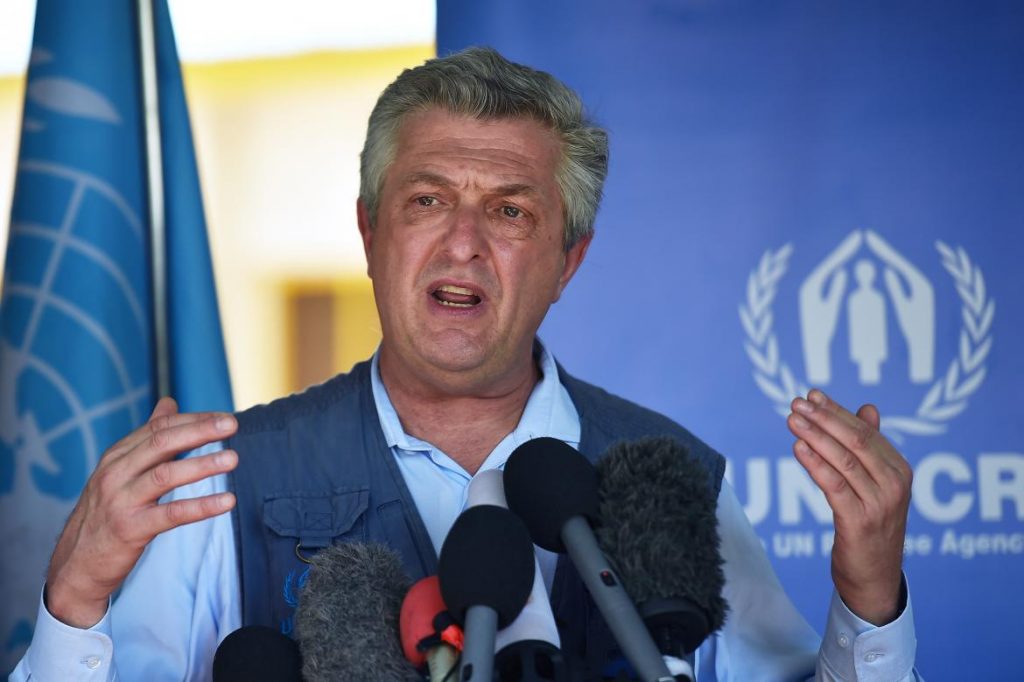By OLIVER SLOW | FRONTIER
YANGON — Even as Myanmar says it is ready to begin the process of repatriating refugees who fled the country to Bangladesh, senior UN officials have warned conditions on the ground are still not conducive for their voluntary return.
Speaking at the United Nations Security Council in New York on Tuesday, Mr Filippo Grandi, UN High Commission for Refugees, said that the causes for people fleeing northern Rakhine State, amid violence and desperation, had not yet been addressed and that there has not been enough progress on tackling the “exclusion and denial of rights” that the Rohingya minority have faced over several decades.
“UNHCR has extended an offer of support to both [Myanmar and Bangladesh] governments, including by participating in the joint working group established for its implementation,” Grandi said by video link.
“The framework for return should eventually be defined in a tripartite agreement between the two governments and UNHCR. Our offer of support remains open.”
Support more independent journalism like this. Sign up to be a Frontier member.
In January, Myanmar and Bangladesh agreed a deal to begin repatriation on January 23, but the process has been delayed by Dhaka. Human Rights groups, and refugees in Bangladesh, have expressed concern about their safety if they were to return.
In his speech on Tuesday, Grandi warned Myanmar against rushing the repatriation process.
“The construction of infrastructure to support the logistics of return should not be confused with the establishment of conditions conducive to voluntary repatriation,” he said. “An end to violence and destruction of property, and granting humanitarian access throughout Rakhine State – as called for by the Secretary-General – are critical, and basic steps.”
Mr Pierre Peron, spokesperson for UN OCHA in Myanmar, told Frontier on Tuesday that most humanitarian organisations who have been operating in northern Rakhine State for several years “have still not been able to resume lifesaving programmes for some of the most vulnerable people in the world”.
Some organisations have been given travel authorisations to the area, Peron said, but in a short-term and unpredictable manner that has impacted the delivery of assistance and an assessment of the people’s needs.
“We are talking about people who are stateless, who don’t have freedom of movement, who have limited access to essential services such as health and education, and who for years have had no choice but to depend on humanitarian assistance. When you cut that lifeline, there is a very real human impact,” Peron said.
In central Rakhine, UN agencies and NGOs are facing bureaucratic obstacles that are affecting their ability to deliver aid and assistance
“This is affecting both humanitarian aid and longer-term development initiatives, so people need to understand that the restriction of access is bad news for everyone, including for the ethnic Rakhine communities who rightly call for more development assistance from the international community,” Peron said.
Myanmar has faced fierce international criticism for its handling of the crisis in Rakhine State, in which an estimated 688,000 people – overwhelmingly Rohingya – have fled to Bangladesh since late August, when fighters from the Arakan Rohingya Salvation Army attacked police outposts and an army camp, killing about a dozen security personnel.
While it initially exonerated its personnel from conducting any human rights abuses during its Rakhine operation, in January the military admitted that security forces were involved in the killing of 10 Rohingya men at Inn Din village, Maungdaw Township.
The statement, published on the Facebook page of the Commander-in-chief, said the military personnel and some villagers killed the men after they came under attack from “terrorists”.
The admission came about a month after two Reuters journalists, Ko Wa Lone and Ko Kyaw Soe Oo, were arrested in Yangon while researching the Inn Din incident.
Last week, Reuters published its version of the story, which differed from the military’s account. Based on testimony from witnesses and people involved in the killings, the Reuters report said there was no attack by insurgents in Inn Din.
Also speaking at the Security Council on Tuesday, United States Ambassador to the UN Ms Nikki Haley called Myanmar’s denial of ethnic cleansing “preposterous”.
To make sure no one contradicts their preposterous denials, they are preventing access to Rakhine to anyone or any organisation that might bear witness to their atrocities, including the UN Security Council,” she said, adding her voice to the calls for the release of the Reuters reporters.
Hau Do Suan, Myanmar’s UN Ambassador, said that Myanmar recognises freedom of the press and the journalists were not arrested for reporting a story, but for “illegally possessing confidential government documents”.
“Every citizen is bound by the existing law of the land. It is important that the actions of the journalists must also be within the bound of the law,’ he said.
On Tuesday, PEN America, announced that it is honouring Wa Lone and Kyaw Soe Oo with its PEN/Barbey Freedom to Write Award. PEN said that 42 jailed writers have received the award since 1987, 37 of which were released.
“It can help elevate the case diplomatically,” said Ms Suzanne Nossel, executive director of PEN America.







